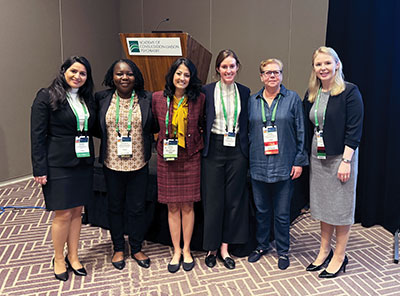The psychological impact of infertility or pregnancy loss—as well as the effort to conceive through in vitro fertilization—is enormous and lasting, but typically not fully appreciated by health care professionals, said psychiatrists during a panel discussion at the 2023 annual meeting of the Academy of Consultation-Liaison Psychiatry in Austin.
Speakers emphasized that some psychiatric conditions may affect fertility, and substantial psychiatric comorbidity is common among couples experiencing infertility. In addition, there is significant disparity in access to and utilization of infertility services among Black, Hispanic, and other racial/ethnic groups (see box). Panelists also noted that there is a dearth of research on male infertility; the predominant focus of research is on female infertility.
“Infertility is significantly related to increased psychological distress and is both an individual experience of grief and one that is borne within the larger context of one’s marriage or intimate relationship, family, and culture,” said Maureen Cassady, M.D., a psychiatrist at Brigham and Women’s Hospital, Boston. “And we know that health care professionals frequently underestimate this psychological burden.”
She presented findings from a striking 2019
summary of qualitative interviews with women experiencing infertility in
The Family Journal, the journal of the International Association of Marriage and Family Counselors. Those interviews revealed three themes of what the authors termed “grief disenfranchisement”: grief that cannot be openly acknowledged, grief that cannot be publicly mourned, and grief that cannot be socially supported.
One woman, comparing the mourning one can usually do when a friend or loved one dies with the grief associated with the inability to conceive, said the following: “You find out the person passed, and you’re sad that they’re gone. You celebrate their life with a funeral and say goodbye, and then you start to move forward with your life. I don’t get to do that.” “That really highlights the invisibility of the loss and the difficulty of moving past it,” Cassady said.
Psychiatric Symptoms Comorbid With Infertility
Infertility is defined as the failure to achieve pregnancy after 12 months of regular unprotected sexual intercourse (or six months for individuals aged 35 and above). Diana Punko, M.D., an attending psychiatrist at Massachusetts General Hospital, noted that infertility affects a large proportion of the global population, with approximately 1 in 6 people experiencing infertility at some point, according to the World Health Organization. A Centers for Disease Control and Prevention
report based on 2015-2019 data from the National Survey of Family Growth indicated that 12.2% of women aged 15 to 49 have used infertility services.
Punko and other speakers focused on infertility specifically; however, literature on “reproductive trauma” often includes recurrent pregnancy loss. In a 2020 paper in
Fertility and Sterility titled “
Definitions of Infertility and Recurrent Pregnancy Loss: A Committee Opinion,” the Practice Committee of the American Society of Reproductive Medicine wrote, “Recurrent pregnancy loss is a disease distinct from infertility, defined by the spontaneous loss of two or more pregnancies.”
Punko said several psychiatric conditions across the lifespan may affect fertility: bulimia nervosa, binge eating disorder, obesity, trauma spectrum and related disorders (particularly with a history of sexual trauma), tokophobia (fear of pregnancy), and sexual dysfunctions.
Punko also cited a
2016 study in
Current Psychiatry Reports showing that infertility and perinatal loss are associated with lower quality of life, higher rates of marital discord, major depressive disorder, anxiety disorders, and posttraumatic stress disorder. The authors of that study concluded, “It is especially important to detect, assess, and treat depression, anxiety, or other psychiatric symptoms because infertility or perinatal loss may be caused or perpetuated by such symptoms. Screening, psychoeducation, provision of resources and referrals, and an opportunity to discuss their loss and plan for future pregnancies can facilitate addressing mental health concerns that arise.”
Women Report ‘Sense of Being Failed’ by Health Care System
More recent studies confirm the enormous psychological burden of infertility and the failure of the health care system to recognize and address that burden. For instance, Cassady cited a September 2023
meta-analysis in
Sexual and Reproductive Healthcare that included qualitative interviews with 503 women. Three main themes were identified: a sense of personal “reproductive trauma” associated with infertility and with in-vitro fertilization, the impact of infertility on relationships, and the sense of being failed by the health care system and society.
“The personal trauma and experiences included stress, grief, inability to focus, insomnia, anxiety, withdrawing from others, sense of hopelessness, and guilt and shame,” according to the report. “The infertility and IVF journey also either caused conflicts in relationships or helped the couples to grow stronger. At the same time, relationships with friends and family were strained due to isolation and feeling stigmatized and not understood. Finally, the health care system and providers lacked adequate support, holistic and caring care, and the women felt dehumanized and failed by the health care system.”
Other panelists included Azadeh Zamiri, M.D., a psychiatry resident at BronxCare Health System, who discussed psychiatric medications and infertility; and Josephine Mokonogho, M.D., an attending psychiatrist at Christiana Care Health System, who discussed psychiatric evaluation and management of women undergoing in-vitro fertilization. ■

